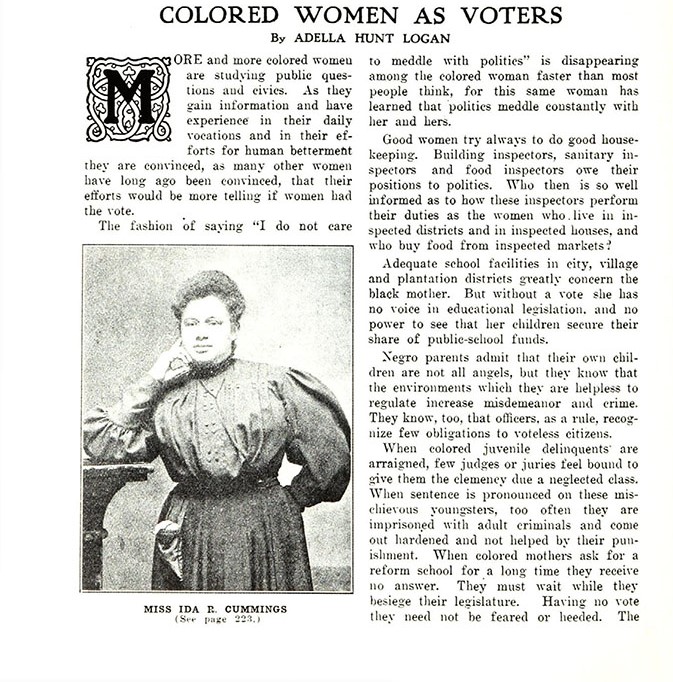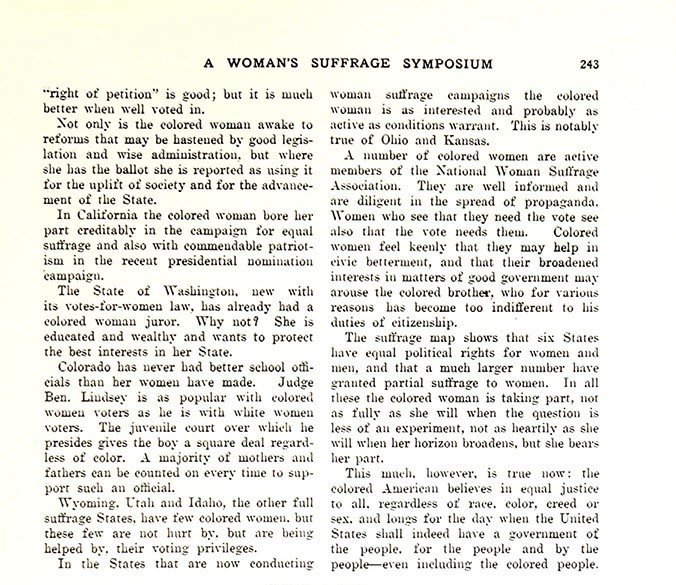Home / Modernizing America, 1889-1920 / Woman Suffrage / Black Suffragists
Resource
Black Suffragists
An article written by Adella Hunt Logan and published in the NAACP’s magazine, The Crisis. It includes reasons why the vote was particularly important to Black women.
- About
-
Curriculum
- Introduction
-
Units
- 1492–1734Early Encounters
- 1692-1783Settler Colonialism and the Revolution
- 1783-1828Building a New Nation
- 1828-1869Expansions and Inequalities
- 1832-1877A Nation Divided
- 1866-1898Industry and Empire
- 1889-1920Modernizing America
- 1920–1948Confidence and Crises
- 1948-1977Growth and Turmoil
- 1977-2001End of the Twentieth Century
- Discover
-
Search
Document Text |
Summary |
| COLORED WOMEN AS VOTERS By Adella Hunt Logan More and more colored women are studying public questions and civics. As they gain information and have experience in their daily vocations and in their efforts for human betterment they are convinced, as many other women have long ago been convinced, that their efforts would be more telling if women had the vote. |
More and more Black women want the vote. |
| The fashion of saying “I do not care to meddle with politics” is disappearing among the colored woman faster than most people think, for this same woman has learned that politics meddle constantly with her and hers. | Black women appreciate that their lives intersect with politics and that they should care about the vote. |
| Good women try always to do good housekeeping. Building inspectors, sanitary inspectors and food inspectors owe their positions to politics. Who then is so well informed as to how these inspectors perform their duties as the women who live in inspected districts and in inspected houses, and who buy food from inspected markets? | If women are in charge of the home, they should have a say in the people and organizations that inspect and monitor homes. |
| Adequate schools facilities in city, village, and plantation districts greatly concern the black mother. But without a vote she has no voice in educational legislation, and no power to see that her children secure their share of public-school funds. | Black mothers are concerned about education and need the vote to ensure their children receive the good education they deserve. |
| Negro parents admit that their own children are not all angels, but they know that the environments which they are helpless to regulate increase misdemeanor and crime. They know, too, that officers, as a rule, recognize few obligations to voteless citizens. | Black parents cannot improve the juvenile justice system without the vote. |
| When colored juvenile delinquents are arraigned, few judges or juries feel bound to give them the clemency due a neglected class. | When young Black people appear in juvenile court, judges and juries treat them like members of an inferior class. |
| When sentence is pronounced on these mischievous youngsters, too often they are imprisoned with adult criminals and come out hardened and not helped by their punishment. | Too often, young Black people are imprisoned with adults. |
| When colored mothers ask for a reform school for a long time they receive no answer. They must wait while they besiege their legislature. Having no vote they need not be feared or heeded. The “right of petition” is good; but it is much better when well voted in. | Black mothers want to reform schools and the juvenile justice system. Without the vote, legislators don’t have to listen to these women. |
| Not only is the colored woman awake to reforms that may be hastened by good legislation and wise administration, but where she has the ballot she is reported as using it for the uplift of society and for the advancement of the State. | In states where women already have the vote, Black women are using it to make change. |
| In California the colored woman bore her part creditably in the campaign for equal suffrage and also with commendable patriotism in the recent presidential nomination campaign. | Black women in California fought for the vote and are now voting. |
| The State of Washington, new with its votes-for-women law, has already had a colored woman juror. Why not? She is educated and wealthy and wants to protect the best interests in her State. | A Black woman in Washington sat on a jury. |
| Colorado has never had better school officers than her women have made. Judge Ben. Lindsey is as popular with colored women voters as he is with white women voters. The juvenile court over which he presides gives the boy a square deal regardless of color. A majority of mothers and fathers can be counted on every time to support such an official. | Black mothers in Colorado support a juvenile court judge who treats Black boys fairly. |
| Wyoming, Utah and Idaho, the other full suffrage States, have few colored women, but these few are not hurt by, but helped by, their voting privileges. | Black women in Wyoming, Utah, and Idaho are also voting. |
| In the States that are now conducting woman suffrage campaigns the colored woman is as interested and probably as active as conditions warrant. This is notably true of Ohio and Kansas. | Black women are actively involved in the fight for the vote in Ohio, Kansas, and other states. |
| A number of colored women are active members of the National Woman Suffrage Association. They are all well informed and are diligent in the spread of propaganda. Women who see that they need the vote see also that the vote needs them. Colored women feel keenly that they may help in civic betterment, and that their broadened interests in matters of good government may arouse the colored brother, who for various reasons has become too indifferent to his duties of citizenship. | Black women are fighting for the vote and know that it will help them improve the lives of all Black citizens. |
| The suffrage map shows that six States have equal political rights for women and men, and that a much larger number have granted partial suffrage to women. In all these the colored woman is taking part, not as fully as she will when the question is less of an experiment, not as heartily as she will when her horizon broadens, but she bears her part. | Wherever women have the vote, Black women are voting and working to make change. More Black women will vote as the idea of women voting becomes more acceptable and opportunities for Black women expand. |
| This much, however, is true now: the colored American believes in equal justice to all, regardless of race, color, creed or sex, and longs for the day when the United States shall indeed have a government of the people, for the people and by the people—even including the colored people. | Black Americans believe in equal justice for all and look forward to a day when they will experience that equality. |
“Colored Women as Voters.” The Crisis, September 1912. The Modernist Journals Project: Brown University and the University of Tulsa.
Background
Not all suffragists were white middle-class women. Black suffragists like Mary Church Terrell, Ida B. Wells, and Fannie Barrier Williams played an important role in the fight for woman suffrage. Black suffragists had the double challenge of fighting both gender and racial stereotypes. Large national organizations like the National American Women Suffrage Association invited select Black leaders to attend meetings or speak at conventions. But most Black suffragists did not enjoy this experience. As the national woman suffrage movement focused on courting white, native-born supporters, Black women formed their own suffrage organizations. These organizations empowered Black women not only to fight for the vote, but also to bring attention to the wider struggles of the Black community. Black women argued that the vote would make them powerful enfranchised citizens in a nation divided by race.
For more about suffrage for Black women, watch the video below.
This video is from “Women Have Always Worked,” a free massive open online course produced in collaboration with Columbia University.
About the Document
This article appeared in a special suffrage issue of The Crisis, a magazine published by the National Association for the Advancement of Colored People (NAACP). The author, Adella Hunt Logan, was an influential leader in the Black community. She and her husband, Warren Logan, were teachers at the Tuskegee Institute in Alabama. It was there that she organized monthly suffrage meetings. Adella died in 1915 and did not live to see national woman suffrage achieved.
Vocabulary
- arraigned: To be accused of committing a crime.
- enfranchised: Granted the right to vote.
- juvenile: Young person.
- misdemeanor: A minor crime.
- propaganda: Materials or ideas that spread information intended to persuade people to take action.
- Tuskegee Institute: An Alabama school founded by Booker T. Washington in 1881 for the purpose of training Black teachers.
Discussion Questions
- What are the key points in this document? How does Adella Hunt Logan make the case for Black women to vote?
- How does Adella Hunt Logan specifically address the experience of Black women and their relationship to the question of suffrage?
- How does Adella Hunt Logan link woman suffrage to the juvenile justice system? How does her argument resonate with contemporary conversations about the American justice system and Black activism?
Suggested Activities
- AP Government Connections:
- 3.10: Social movements and equal protection
- 3.11: Government responses to social movements
- Explore the ideas and actions of Black suffragists by reading Adella Hunt Logan’s article in tandem with Fannie Barrier Williams’s article, Mary Church Terrell’s life story, and Ida B. Wells’s life story.
- Explore how Black and white suffragists presented different arguments for the vote. Compare this article and Fannie Barrier Williams’s article “Fannie Barrier Williams Lauds Chicago Women” to the pro-suffrage argument “Women in the Home” and Rose O’Neill’s “Together for Home and Family” poster.
- Pair this document with the photograph taken by anti-suffragists in Tennessee. Why might the women in the photograph (and those they represented) have posed a particular threat to Black suffragists? Why might Adella Hunt Logan’s article have been perceived as a threat to the women in the photograph (and those they represented)?
- Consider the many ways Black women fought to legitimize their citizenship and fight discrimination by studying this source alongside Fannie Barrier Williams’s description of Black life in Chicago, the account of two Black social workers on the French front, the photograph of the 1917 silent march, the photograph of Atlanta Neighborhood Union, and the life stories of Mary Church Terrell, Madam C.J. Walker, Ida B. Wells, and Maggie Walker.
Themes
AMERICAN IDENTITY AND CITIZENSHIP; ACTIVISM AND SOCIAL CHANGE
New-York Historical Society Curriculum Library Connections
- For more about Black experiences in this era, see Black Citizenship in the Age of Jim Crow.








